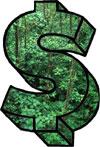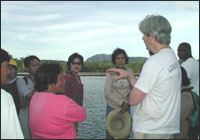Joshua Farley, a researcher at the Gund Institute for Ecological Economics, didn’t get into economics to make money. In fact, he tells me, he almost quit the academy altogether to go back to carpentry — a far more lucrative career prospect.
“When I graduated, there were virtually no jobs in ecological economics. I applied to the only job I saw. Three years later, I saw three jobs in ecological economics, one of which was the one I already had,” he grins. “Now, if you look under ecological economics, there are a lot of jobs — mostly at liberal arts colleges, but also at the top research universities.”
Farley’s long battle to do the work he is passionate about is a telling story — and one he loves to tell. When I spoke with him recently at the institute’s new home on the University of Vermont campus, he waxed eloquent on the subject. Farley, who is 40, came to ecological economics the hard way: through an old-guard economics department that thought this young doctoral student’s ideas about the interrelations between natural and economic systems were bunk. He began a PhD program in economics hoping to find ways to connect his previous work in ecology and international development to economic problems. Instead, he felt that he had stumbled into a strange new world, where infinite growth was hailed as a perfectly reasonable goal (isn’t that against the laws of thermodynamics?), all goods were fungible (you mean, when we run out of clean water, we’ll just find something else to drink?), and nobody was interested in the questions he was asking.

Josh Farley in his Gund Institute office.
Sick of constantly battling his advisory committee over everything from the courses he took to the equations that were the centerpiece of his dissertation, he was ready to quit — until he discovered the writings of Herman Daly, the founding father of ecological economics.
“I got very excited again about economics, and was told, ‘No, that’s garbage, you shouldn’t be studying those things.’ I wrote to Herman and told him I wanted to quit, and he said, ‘No, finish it up, we need people who are trained in mainstream economics and know its problems.’ Basically, if you want to convince people that something is wrong, you have to understand what it is you’re talking about.”
On Daly’s advice, Farley finished what he’d started, earning a PhD from Cornell University. Now, he’s working to ensure that things will be different for the next generation of ecological economists. With Daly, his former mentor, Farley is writing a textbook on ecological economics that will be the first of its kind — one he hopes will encourage more universities to offer training in the ideas and techniques of the new economic science. The book is slated for publication in August 2003.
And Farley has also learned to dole out his own advice to anyone interested in economics: Study something else as well. “It’s a vaccine against accepting mainstream economics,” he says. “If you’ve been inoculated with biology, or ecology, or even physics, and you start looking at mainstream economics, you say, ‘Wait a minute, this just can’t be, this doesn’t make sense, these things aren’t true.'”
The Trouble with Econ 101
Among the assumptions of traditional economic theory are a few that are nothing short of baffling: that people are perfectly rational, that they have free access to all information, that they seek to consume as much as possible. (In a famous essay, Thorstein Veblen called the economist’s improbable individual a “homogenous globule of desire.”) Although economists concede that human behavior doesn’t always match their assumptions, the models they use tend to assume that deviations from the ideal are just so much random noise.
More troubling still is the assumption free-market economics makes about nature: that we don’t need it. Because everything is theoretically substitutable for everything else, when we run out of nature, we’ll just substitute technology. That, says Farley, is a religious belief, not a scientific one.
“That’s essentially a faith-based position, that we will always develop substitutes,” he says. “It also ignores this idea that ecological economists are concerned with, that ecosystem services don’t fit into the market mold. They don’t have a price — price is a feedback signal — so there is no signal, as they grow scarcer, to tell us we need to develop substitutes.”
In the market, the price of a good is related to its scarcity. That’s the reason why diamonds, which are fairly useless, are more expensive than water, which is, to put it mildly, fairly useful. In theory, the scarcer a good becomes, the more expensive it becomes, until people will substitute something else for it rather than continuing to pay steeper and steeper prices. The trouble is, this system, which works very well for things like diamonds, doesn’t work well at all for things like ozone layers.
“Free-market economics works great, for a certain narrow class of goods and services,” says Farley. “But there’s a huge, broad class of goods and services that are incredibly important to our well-being where it doesn’t work at all.”
The real world almost never lives up to the assumptions of free-market economic theory. But economists have persisted in believing in those assumptions, says Farley, because they haven’t behaved like scientists: Instead of counting market failures as evidence against their theories, economists have criticized markets for not measuring up. “In ecology, if your theory is not supported by real life, you change your theory. In economics, if your theory is not supported by real life, you try to come up with policy measures that change real life to make it a closer fit to your theory.”
The Birth of a New Paradigm
Ecological economics has all the flavor of a Thomas Kuhn-style scientific revolution — wherein a new paradigm radically alters and replaces an older one — and therefore, the road to acceptance has been rocky. “Herman Daly has very rarely been published in a mainstream economics journal. Bob Costanza [the director of the Gund Institute] has probably never been published in a mainstream economics journal,” says Farley. “I’ve been invited to give lots of presentations, by former students of mine and by other people, where they have tried to get the economists to come. The economists simply boycott it. They don’t want to hear it.”

But, like any good paradigm, this one finally seems to be gaining traction. In the few years since Farley was a graduate student, there has been a veritable explosion in the field. Ecological economics, once obscure, now makes international headlines. And, as the failure of free markets to ensure global well-being becomes increasingly apparent, more and more people — from black-masked anti-globalization protestors to Nobel laureates — seem to be taking a hammer to the ivory tower of mainstream economic theory.
The Post-Autistic Economics movement, which began a few years ago in the brains of a few frustrated French graduate students, is now an international phenomenon. Both traditional economists and sufferers of autism share a few characteristics, they say: abnormal subjectivity, living in a world of fantasy, and difficulty communicating with others. PAE supporters at European universities have circulated petitions and scrawled slogans like this one, emblazoned on a wall on a Madrid campus: “La economia es de gente, no de curvas!” (“Economics is about people, not curves.”)
The last two Nobel prizes in economics have been awarded to heretics. In 2001, the prize went to Joseph Stiglitz, George Akerlof, and Michael Spence for their work on how markets fail when the “perfect information” assumption isn’t met. (Ironically, Stiglitz had recently been dismissed from his advisory role at the World Bank for spreading his heresy.) Last year, it was awarded to Daniel Kahneman and Vernon Smith, who used tools from psychology to demonstrate that traditional economics makes bad predictions because humans behave in systematically irrational ways.
Economics in Action
While these critics are not ecological economists, they share with them the sensibility that economics ought to be treated as empirical science, not dogma. The best way to study how human beings behave in the agora, they say, is not to theorize, but to roll up your sleeves, go out into the world, and find out.

Josh Farley, speaking to participants
in the Gund Institute’s 2003 workshop
near Palawan, Philippines.
And that’s exactly what Farley and his colleagues do. Since last year, the Gund Institute has been hosting a series of “ateliers,” or field workshops, in which an interdisciplinary team of students and faculty works with government officials, nonprofit organizations, and local stakeholders to address problems from diverse angles. The workshops serve a threefold purpose: studying ecological economics in action, training students in research techniques, and solving real-world problems in conjunction with local communities.
The most recent atelier, which focused on the illegal destruction of mangrove forests in the Philippines to make way for shrimp aquaculture, had a dramatic outcome. When the local participants realized how much the offending shrimp farm was costing the community by displacing ecosystem services, they tore it down with pickaxes. La economia es de gente, indeed.
